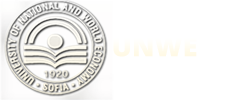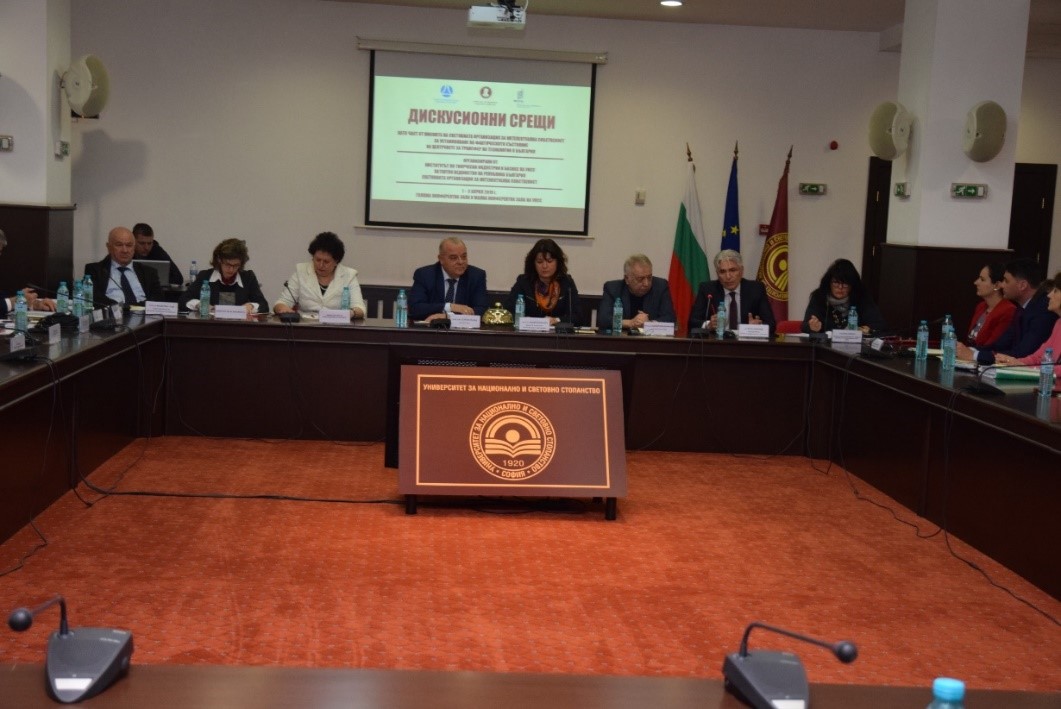Discussion meetings - part of the WIPO Fact-finding mission
Between 1-3 April 2019 UNWE was a host of a series of discussion meetings - part of the World intellectual property organization's (WIPO) Mission to determin the factual state of the centers for technology transfer in Bulgaria. The event was organized by the Institute of creative industries and business in cooperation with the Bulgarian patent office. Among the participants in the forum were representatives of academic community, the Ministry of education and science, the Ministry of economy and other govenmental institution, business associations, centers for technology transfer and others. The moderator of the meetings was prof. dr. Vladia Borissova, director of the Institute of creative industries and business.
During the opening prof. D.Sc.(Econ.) Stati Statev noted that:
„UNWE is the most appropriate host of today's discussions because our university 30 years ago and thank to the patience and relentless work of prof. Borislav Borissova, started the education in intellectual property. Even now we are not just pioneers but also the only university structure in our country that continues to develop this extraordinarily important subject.
I thank the rectors of universities where there are centers for technology transfer, the Ministry of education and science, the Ministry of economy, for facing the problems that will be discussed today and the business, the four nationally represented employer organizations with which the UNWE has working contracts. They all responded accordingly, which gave the opportunity for a successful completion of the first stage, that involved the filling and analysis of questionnaires by WIPO. We have the understanding of all participants for the beginning of the second stage. I am certain that it will be successfull and in the end we will achieve results and present them to the attention of all interested institutions and indicate to them once again that the subject we deal with is one of not just the present but also the future. Once again I thank all the participants for their contribution in our joint work."
 |
In his address to the participants in the Discussion Meetings Prof. Dr. Borislav Borissov, Honorary Rector and Honorary Professor of the University of National and World Economy, said:
"Thank you, Mr. Rector, for the good words about the 30th anniversary of the creation of the Intellectual Property Department, now the Institute of Creative Industries and Business. They are 30, and I hope they will become more and more thanks to the continuity of work and the positive attitude of university leadership to intellectual property issues, including the support of the current Rector's management to the new management of the Institute of Creative Industries and Business.
I am delighted that the World Intellectual Property Organization’s Mission is coming at a very good time for the situation in Bulgaria. I will explain why. You know that the very notion of intellectual property was introduced in the world relatively soon - after the adoption of the Stockholm Convention in 1968. In Bulgarian law, this concept was introduced 25 years later with the adoption of the new 1993 Patent Law.
In higher education legislation, however, the term "intellectual property" was first legislatively reflected in the amendments to the Higher Education Act made in 2016. This was thanks to the efforts of many people and many structures as well as the fact that at that time I was chairman of a parliamentary group, chairman of a parliamentary committee, and around me there were a lot of people in the Education and Science Commission who worked in this area and had a concept of intellectual property and note - despite the resistance of the Ministry of Education and Science.
The following were recorded in the law:
First, the concept of "intellectual property objects" created by universities has been introduced.
Second, for the first time, it was accepted that universities could conduct business with the results of their research and other intellectual property (until then the law banned universities from doing business).
It is a production that universities create in their subject-matter, whether they are technical, business universities, universities of arts, etc. Each of them creates an object of intellectual property that the universities have not been able to dispose of so far.
Patent law allows universities to be applicants and in that way become patent owners, but what if they cannot economically realize it - cannot sell it, cannot license it, cannot implement it because all this is an economic activity that is forbidden to universities and by whom? From the Higher Education Act! With the addition and amendment of the law in 2016, this was resolved.
The third one, which is related to the intellectual property objects, is that a separate law article states that universities can set up commercial companies for the purpose of economic activity on the research results and other intellectual property objects. It was stated in the law that six months after its adoption, in order to establish the commercial companies that will carry out the commercial realization of the intellectual property objects, the Council of Ministers should issue a regulation on the order in which they are created, similar to the Regulation on the Establishment of Commercial Companies with state participation. The six months have passed many times since 2016, but there is no regulation, regardless of the obligation in the law. As long as this is not the case, the technology transfer centers we are making will struggle with windmills because this transfer cannot be done without the necessary actions that come under the notion of "economic activity".
Thus, to some wonderful decisions adopted by the National Assembly, the Higher Education Act opposes and successfully counters no other, but the Ministry of Education and Science itself. Why it is said "and Science" – it is not clear. I cannot understand why this resistance is against universities benefiting from their scientific output. What is the problem of gaining from this?
I've probably said it a thousand times before: look at Harvard - 27 billion a year of extra revenue mainly from sold licenses. Well, we will not win 27 billion, but why not gain from and for Bulgarian science at least 1-2 billion. Isn’t that of help for both the budget and the university? This resistance is not understandable. That is why the WIPO Mission is very timely, and if they have to make any conclusions about Bulgaria, it should be pointed out that while this regulatory problem is not solved, the university technology transfer centers will only exist in a half-life within a book and will not be able to realize the purpose for which they were created. "
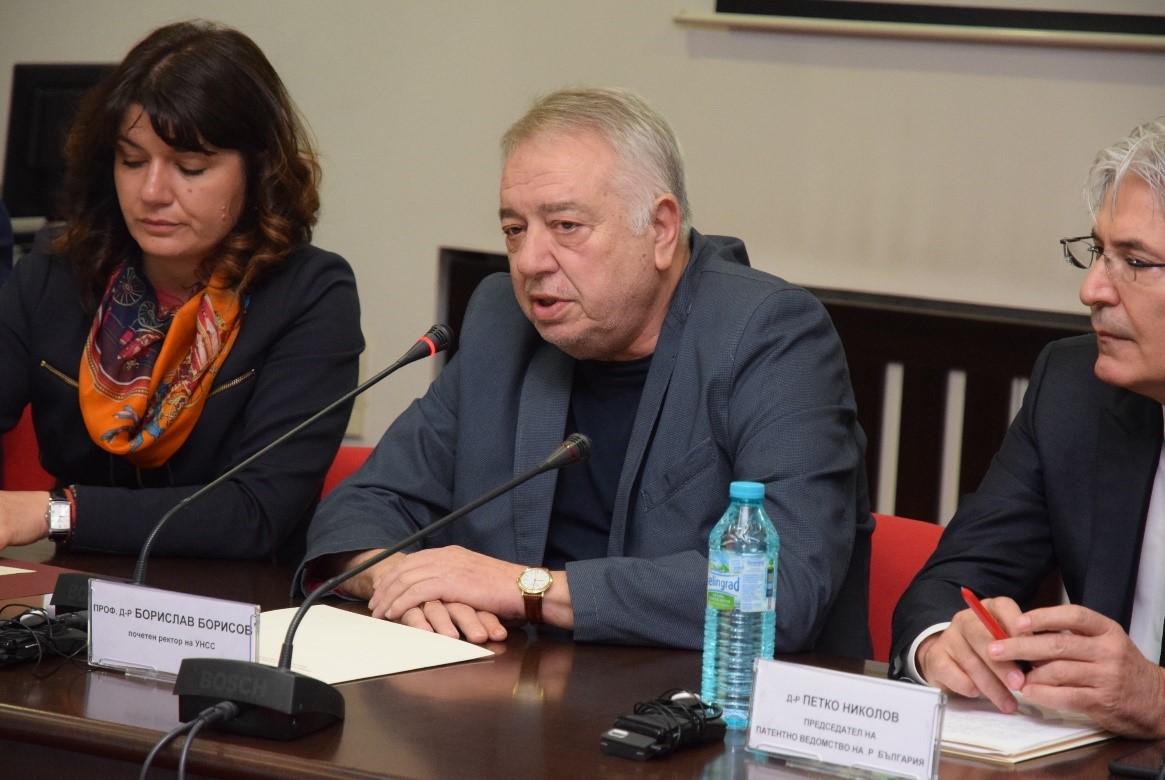 |
| Prof. dr. Borislav Borissov (in the middle) |
Dr. Petko Nikolov pointed out that the University of National and World Economy is the most suitable place for discussion at a high academic level on a topic of significance for the prosperity of our country. According to him, Bulgaria can be the place where people have the freedom and the opportunity to realize their potential, as well as to direct their ambitions, life and professionalism in the direction they want. It is therefore very important to optimize the national technology transfer policy, which will contribute to solving the problems of intellectual property and the development of innovative business in our country.
 |
| Dr. Petko Nikolov |
Mrs. Zlatina Karova said that Ministry of Education and Science supports the development of intellectual property. She presented the specific tasks the Ministry has set in its program to increase the level of development of the intellectual property management system, to establish a link in business-science relations to commercialize intellectual property and to support the activities of technology transfer centers in Bulgaria.
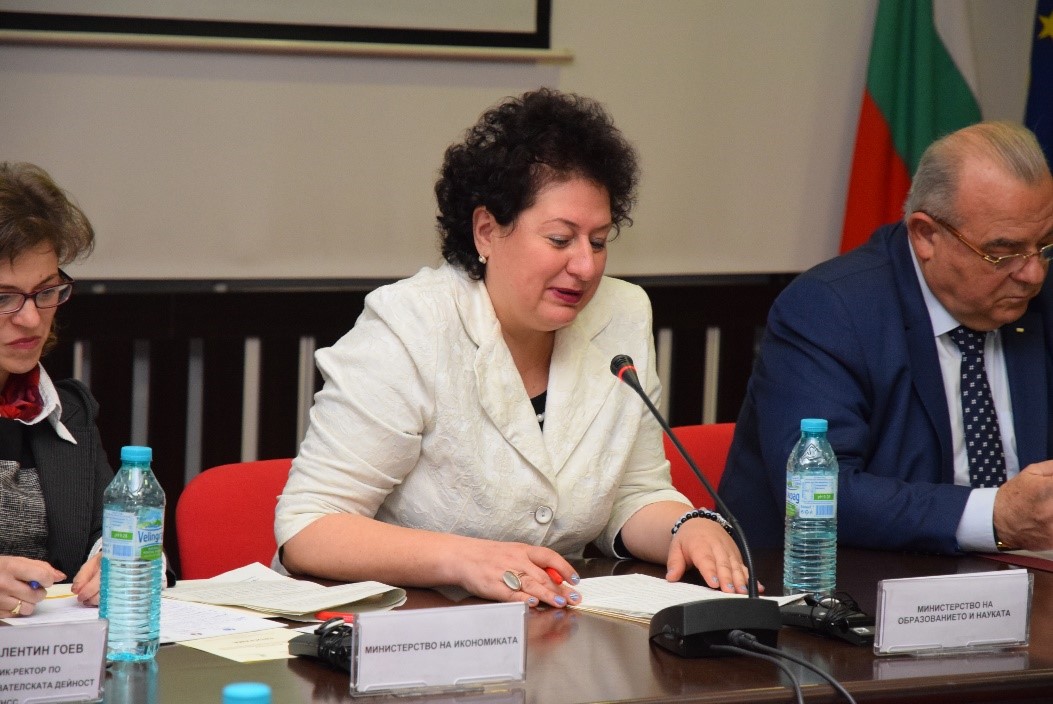 |
| Zlatina Karova (in the middle) |
Ms. Tihomira Palova (UNWE graduate) congratulated the organizers on behalf of the Ministry of Economy and expressed the readiness of the Ministry to establish feedback and work together to remove barriers and solve the problems of technology transfer centers as a link between science and business. For this purpose, the Ministry has prepared a strategy that provides financial support to technology transfer centers. It is also planned to create a special fund for their support.
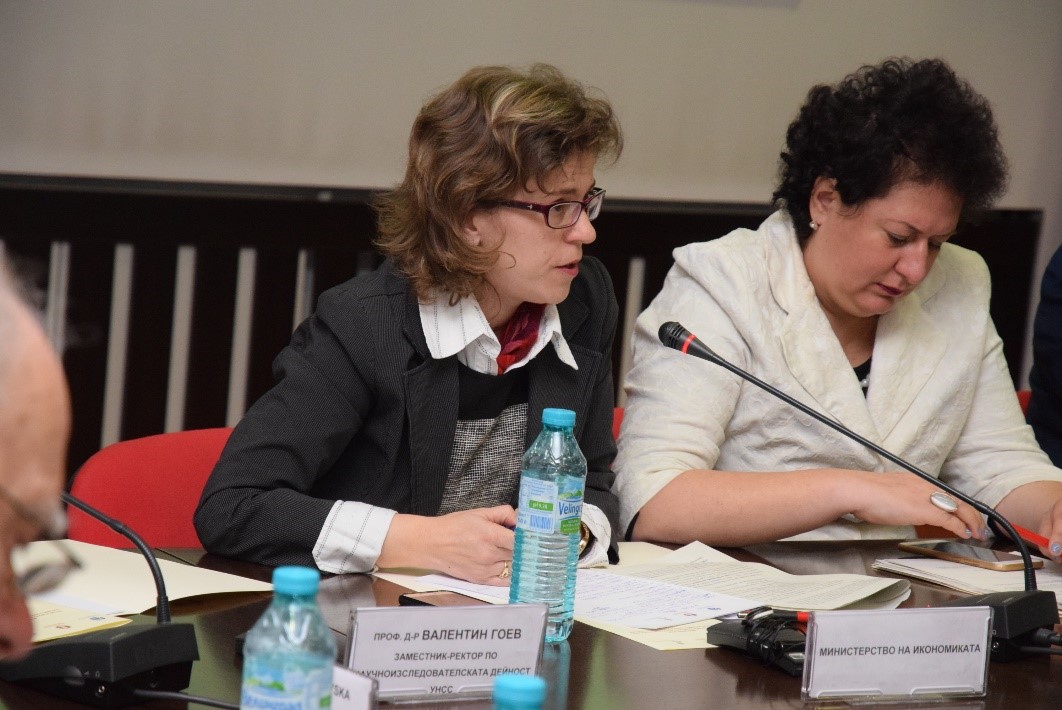 |
| Tihomira Palova (on the left) |
Deputy Chairman of Bulgarian Chamber of Commerce - Petar Denev expressed his admiration to the organizers of the initiative for the discussion - part of the WIPO Mission, to seek a cure for the Bulgarian economy and our convergence in the European family in the conditions of the fierce world race, which sets higher laths. He pointed out ten Bulgarian innovative solutions in different spheres and stressed that the future is to create a cure for the knowledge economy to prove that there are talented scientists and scientific achievements in Bulgaria that need to find their application.
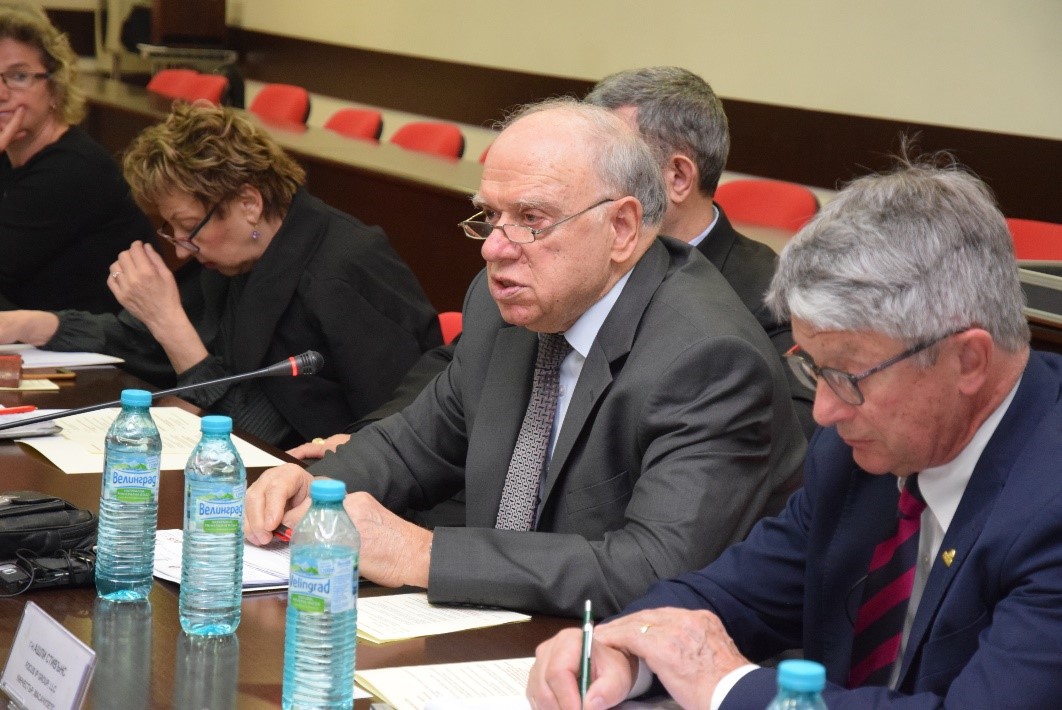 |
| Mr. Ashley Stevens, expert of the WIPO Mission and Petar Denev (from right to left) |
On behalf of the Bulgarian Chamber of Commerce and Industry (BCCI), the organizers were welcomed by Assoc. Prof. Dr. Yosif Avramov, Chairman of the BCCI Innovation Council and a member of the BCCI Management Board, who pointed out that the business wants to enter the universities and that this is why new mechanisms are needed. He focused on funding opportunities for technology transfer centers by using financial instruments and grants and highlighted the benefits of grant funding.
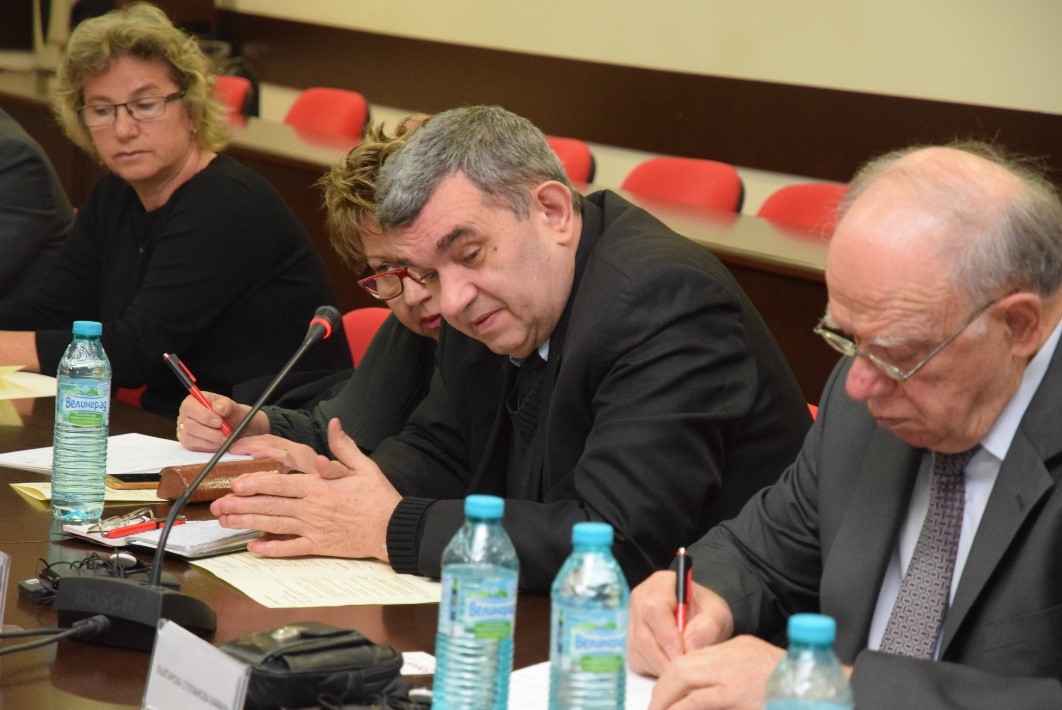 |
| Assoc. Prof. Dr. Yosif Avramov (second from right to left) |
Ms Olga Spasic thanked the organizers for their support for the WIPO mission related to technology transfer centers. According to her, if the lack of regulation of the activity and financing of the centers is of national levels, the main question - who owns research - should be considered globally. She focused on the goals and activities of the WIPO Mission and expressed the readiness of the organization to fully cooperate in creating the necessary regulations and policies to turn technology transfer centers into working systems.
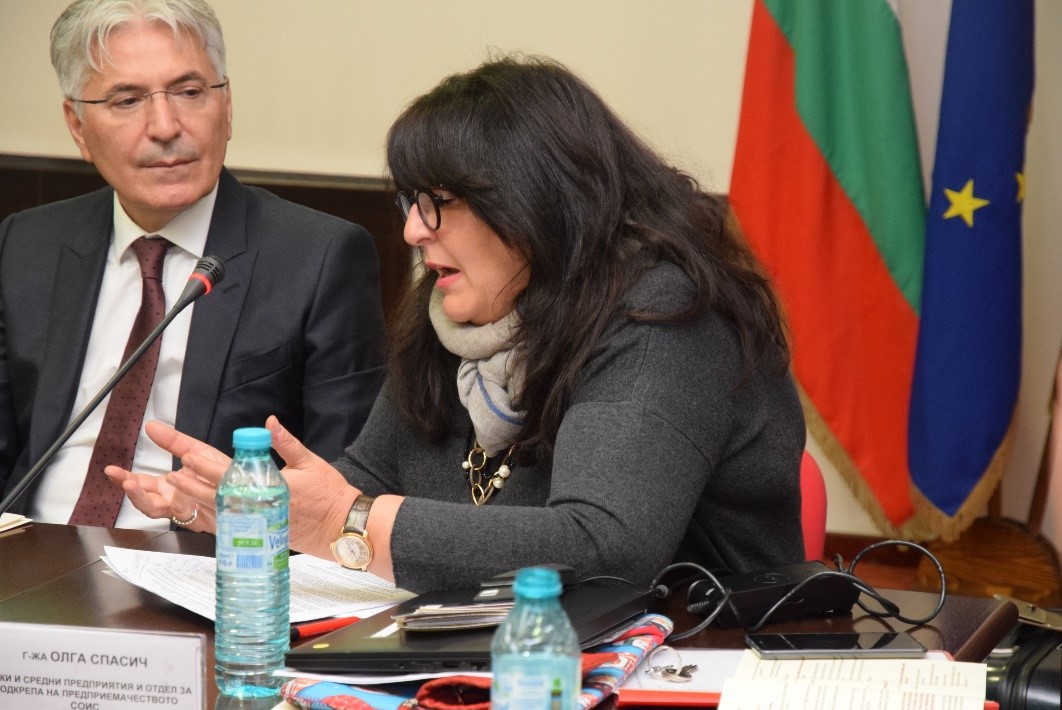 |
| Ms Olga Spasic |
A round table was held during the Discussion Meetings, where participants from the Ministry of Economy, the Ministry of Education and Science, the Innovation Council of the Bulgarian Chamber of Commerce and Industry, the Bulgarian Industrial Association, Confederation of Employers and Industrialists in Bulgaria, Bulgarian Industrial Capital Association, centers for technology transfer to universities in Bulgaria and Bulgarian Academy of Sciences, innovative enterprises and others.
For three days, Ashley Stevens, an international expert at the University of Oxford, who has managed the Technology Transfer Center at Boston University, talked to the participants and analyzed the factual situation to write a report with recommendations for future coordinated actions between state institutions, business associations, academic communities, technology transfer centers and businesses.
 |
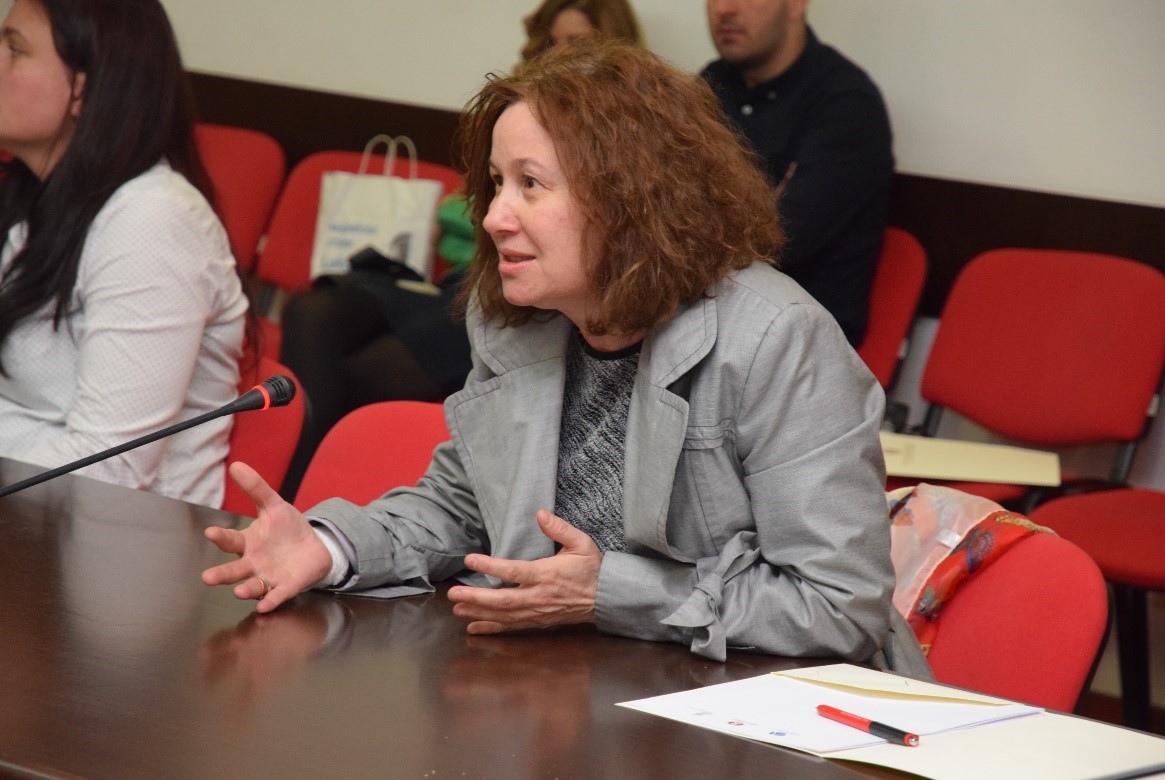 |
